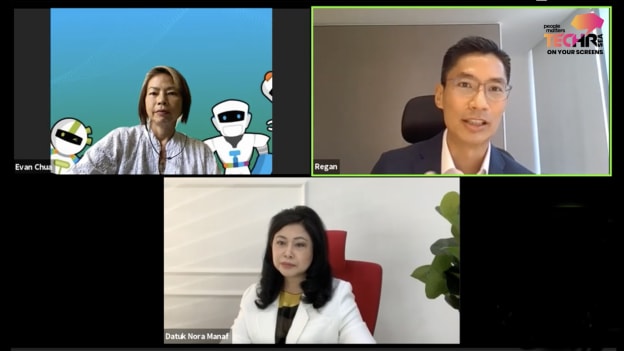Drive interactions, let purpose come from the bottom

Keeping an organisation on track during periods of disruption is complicated, especially when lockdowns have pushed many workplaces towards a hybrid or fully flexible model. But there are a few things HR leaders can do to keep the organisational culture strong and centred around its purpose, said speakers on the first day of People Matters TechHR SEA.
Replicate the interactions
Workplace interactions are the social glue that make up a large part of many organisations' culture, and the HR function can continue to drive this even when people are not in the workplace.
“People are in my industry because they like the interaction,” observed Regan Taikitsadaporn, Chief Human Resources Officer of Marriott International. Speaking on the panel 'Creating a Purpose-Driven Culture in a Hybrid World', he said: “They like dealing with the guests, they like serving each other. And so we've really been focusing on how to ensure that we can help people sustain that.”
In the hard-hit hospitality industry, he pointed out, it is not possible for employees to actually work from home or even have a hybrid working setup—instead, they go on split shifts and have reduced work schedules, and the question for the Marriott International HR team has been how to keep people engaged during the periods when they are not currently at work but would normally have.
So, one thing he and his team did was to set up chat groups on various social media platforms where employees could continue to interact, building the groups around digital learning so that the people involved could make good use of their time.
Datuk Nora A Manaf, Group Chief Human Capital Officer at Maybank, also spoke on the same panel about the importance of learning, not only to keep employees engaged but also to maintain their performance—to keep the edge that they might otherwise lose during the lockdown. “We had mobile based programmes for learners, using the hashtag #learningneverstops, and we told everyone learning is productive time,” she said. “We achieved 38,000 unique learners during that period of the first lockdown!”
Purpose needs to come from the bottom
“If purpose is top down in your organisation, then it's an individual lack, and that is a risk to the organization,” said Datuk Nora. “You really have to find a way to encourage it to come from the middle or better still, from the bottom. And you should celebrate everybody who takes actions that support the purpose that you've chosen for your organisation.”
Agreeing, Taikitsadaporn shared that purpose and values can manifest through the actions employees take even in their own time, and these should be encouraged and supported as much as possible. “At Marriott we have our core values that are part of our DNA, a part of our history, but it's really at the grassroots level that they've made it come alive. This determined what it means when we talk about putting people first or taking care of people,” he said.
As examples, he listed out some of the charitable activities employees had grouped together to launch during their downtime, on their own initiative: preparing lunch boxes to give out to the homeless, volunteering with first responders, providing tutorial services to disadvantaged children whose families do not have the resources to let them learn from home.
“Creating and implementing that purpose does not need to be top down and probably should not be top down,” he said. “I think we should empower every level of the organisation to do what is meaningful to them, and what is purposeful for them. And that is really how you can strengthen the company culture if you're able to accomplish that.”
Trust—making hybrid more human
A final point the panellists raised was the need to make a hybrid environment more human, whether by requiring people to keep their cameras on during video calls, or simply by having constant touchpoints with managers, or even encouraging employees to meet up for social gatherings outside of work where regulations permit.















